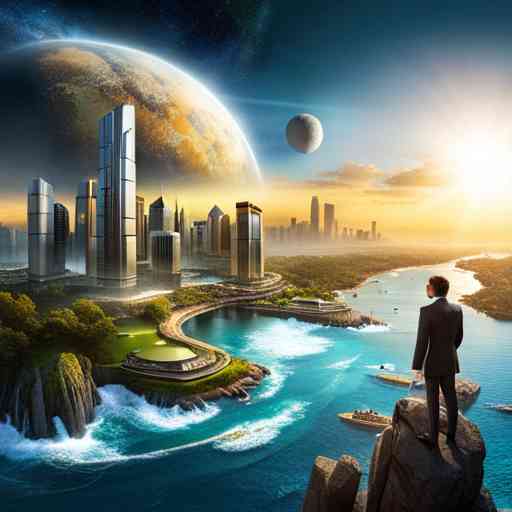The Hidden Complexity: Understanding Breakaway Civilizations
 Imagine a civilization that has advanced technologically and culturally to such an extent that it's almost unrecognizable to the majority of us. Picture a society that has leapfrogged not just years, but centuries into the future, essentially 'breaking away' from the rest of humanity. This is the concept of a 'breakaway civilization', a term that might seem like it's been pulled from the pages of a science fiction novel. But could such a civilization exist, concealed within the folds of our contemporary world? And if so, how would we even begin to recognize it?
Imagine a civilization that has advanced technologically and culturally to such an extent that it's almost unrecognizable to the majority of us. Picture a society that has leapfrogged not just years, but centuries into the future, essentially 'breaking away' from the rest of humanity. This is the concept of a 'breakaway civilization', a term that might seem like it's been pulled from the pages of a science fiction novel. But could such a civilization exist, concealed within the folds of our contemporary world? And if so, how would we even begin to recognize it?
Unseen Breakthroughs: The Technological Divide
To understand the concept of a breakaway civilization, we must first grapple with the very pace of technological innovation. This acceleration is so fast that it's quite possible for large portions of the public to be completely unaware of significant advancements.
Consider some inventions and fields of study that, although foundational to modern science, remain somewhat obscure or misunderstood by the general public. The photophone, for example, was an instrument that transmitted sound on a beam of light, invented by Alexander Graham Bell and Charles Sumner Tainter in 1880, but it is hardly a household name today. This obscurity prevails despite the device's profound implications on the development of communications technology, particularly in the realm of optical telecommunications.
Or take the study of electricity, a phenomenon known to humans for thousands of years but only truly understood and harnessed in the last few centuries. From the ancient Greeks' observations of static electricity to the works of pioneers like Benjamin Franklin, Michael Faraday, and Nikola Tesla, it took us millennia to arrive at our current level of understanding and application. And yet, there is still so much to learn.
Then there are the lesser-known fields of study like spintronics, which exploits the quantum spin properties of electrons to create advanced data storage and transmission devices, or the concept of memristors, the fourth fundamental circuit element that can "remember" its past voltages, which could revolutionize the field of electronics.
Fewer still would know about the microwave hearing effect, an auditory phenomenon induced by modulated microwave frequency radiation, or particle accelerators, devices that use electromagnetic fields to propel charged particles to high speeds and contain them in well-defined beams. The idea of having a particle accelerator on a chip, a concept which could revolutionize medicine, industry, and other fields, might seem purely science-fictional to most.
Quantum Mechanics: The Century-old Newcomer
And let's not forget quantum mechanics, a scientific theory just over a hundred years old that has transformed our understanding of the physical world. Yet, the field remains a mystery to many, despite its profound influence on modern technologies like semiconductors, lasers, and even atomic clocks. Quantum mechanics is undoubtedly counter-intuitive, with ideas like superposition, quantum entanglement, and wave-particle duality that challenge our everyday understanding of reality.
Our Blurry Technological Mirror
In light of this, it seems valid to question whether we can confidently claim to know the current technological capabilities of humanity. Our knowledge, after all, is only as good as our collective memory, understanding, and communication of scientific advancements. If certain technological developments remain obscure or poorly understood even decades after their inception, could there be others completely unknown to the public eye?
Such thought experiments should serve not to sow the seeds of conspiracy theories, but to inspire a sense of humility and wonder at the enormity and complexity of our world. We should always remember to approach claims about technological capabilities - our own and those of others - with both skepticism and an open mind.
The recognition of the existence of a breakaway civilization isn't so much about 'us' versus 'them', but more about understanding the full range of human potential. In that recognition is a call to foster education, collaboration, and inclusivity, to ensure that as many of us as possible can be part of this remarkable journey of discovery and advancement.
So, do breakaway civilizations already exist among us? We may never know for certain. But the questions raised are a reminder of our capacity for innovation, the speed at which it can occur, and the vast breadth of understanding yet to be achieved. As we journey into the future, let's carry this sense of wonder with us. After all, who knows what incredible civilizations we might be on the brink of becoming?